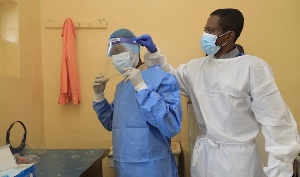Africa News of Thursday, 24 April 2025
Source: www.ghanawebbers.com
African Countries Still Underfunding Health By As Much As 50%
Nairobi — Most African countries have not committed 15 percent of their GDP to health funding. This is concerning, given the continent's growing disease burden. The Abuja Declaration on health funding was established over two decades ago.
Only a few countries, like Rwanda, Botswana, and Cabo Verde, consistently meet this target. Many nations allocate less than 10 percent of their budgets to health. Over 30 AU member states are below the 10 percent benchmark. Some allocate as little as 5-7 percent.
Countries such as Nigeria, Chad, and the Central African Republic face challenges in funding health. Political issues and economic difficulties contribute to low allocations. High debt burdens and narrow tax bases complicate matters. Competing demands for security and infrastructure also strain resources.
Dr. Jean Kaseya from Africa CDC noted that COVID-19 hit national budgets hard. Global economic instability has worsened the situation too. He discussed these issues in a recent report on Africa's health financing.
Wivine M'puranyi from the Democratic Republic of Congo shared her experience with mpox affecting her daughters in 2024. Dr. Kaseya emphasized that underfunding leads to understaffed health departments. He stressed that political will is crucial for prioritizing health investments.
The report revealed that only 16-29 percent of African countries have updated National Health Development Plans (NHDP) and National Health Financing Plans (NHFP). These documents are essential for mobilizing internal resources effectively.
Updating NHDPs and NHFPs requires robust data and skilled teams, according to Dr. Kaseya. Low funding has led many governments to deprioritize these updates due to fears of non-implementation or lack of funds.
Without credible plans, it's challenging to attract more investment in health systems. Countries like Burkina Faso have benefited from updated NHFPs by streamlining healthcare policies.
In Senegal, improved budget predictability came from incorporating macroeconomic forecasting into NHFPs. Dr. Kaseya highlighted that plans must be funded and actively used for real impact.
Africa carries a disproportionate share of global disease burden—25 percent—with only 3 percent of the global health workforce available. This shortage cannot be addressed in isolation; it requires comprehensive strategies.
Recruiting more workers without sustainable financing can strain existing systems further. In some cases, trained professionals remain unemployed due to fiscal constraints or wage ceilings.
Kenya is piloting co-financing mechanisms between national and local governments for better outcomes. Integrated reforms linking financing with recruitment are essential for addressing workforce gaps effectively.
The Africa CDC has proposed a three-pronged strategy aimed at transforming health financing across the continent quickly without excessive bureaucracy due to cuts in Overseas Development Assistance (ODA).
Between 2021 and 2025, ODA decreased by 70 percent, exposing vulnerabilities in Africa's health systems reliant on external funding for critical programs like pandemic preparedness and maternal care services.
Dr. Kaseya suggested implementing rapid strategies such as health taxes on tobacco or sugar products for revenue generation while promoting healthier populations simultaneously.
Strengthening financial units within ministries can improve budget execution significantly at low costs too. Digital tools can enhance tracking of financing flows efficiently with minimal bureaucracy involved.
Countries like Benin, South Africa, and Ethiopia are already seeing progress through digital reforms despite challenges related to fragmented solutions developed independently by donors.
Ghana serves as an example by integrating its national platform with both health and financing data effectively—showing how digitization can lead systemic improvements when led by countries themselves.
For the first time ever, CDC Africa coordinated an emergency response involving multiple partners during the mpox outbreak across AU member states under a unified plan framework—a historic milestone for public health leadership in Africa.
This initiative supported responses to various public health emergencies including mpox outbreaks declared as Public Health Emergencies of Continental Security (PHECS) alongside relevant stakeholders since August 13th, 2024.











